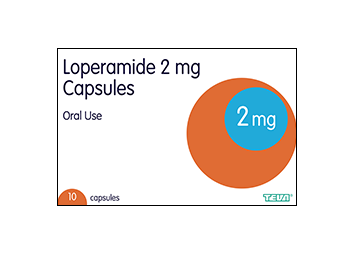Description
Diah Limit – Loperamide Capsules contain the active ingredient, Loperamide, that works to slow the muscular contractions of the intestine, to help relieve diarrhoea.
How does Loperamide work?
Loperamide reduces the speed at which the gut contents are pushed through the intestines, allowing more time for water and electrolytes to be reabsorbed from the gut contents back into the body. It results in firmer stools that are passed less frequently.
Please note this is a generic brand so the brand you receive may vary depending on availability.
Uses / Instructions
How to take:
Adults and children aged 12 and over, to treat sudden short-lived (acute) diarrhoea:
- Take two capsules, with water, to begin with and then, 1 capsule after each episode of diarrhoea.
- Never take more than 8 capsules in any 24 hour period
- If your diarrhoea lasts for more than 24 hours, you should consult your doctor.
- To treat episodes of diarrhoea associated with Irritable bowel syndrome:
- If you know you suffer from Irritable bowel syndrome, take two capsules to control an episode of diarrhoea. Further episodes may be controlled by taking 1 or 2 capsules according to severity, up to a maximum of 8 capsules a day.
- If your symptoms change or if your acute symptoms persist for more than 2 weeks, consult your doctor.
Warnings
Do not use Diah Limit – Loperamide Capsules:
- If you are allergic to loperamide or any other ingredients in this product
- In children under the age of 12
- If your doctor has told you that you have a condition where slowing of the stomach or intestine should be avoided. For example:
- Constipation
- Bloated tummy (particularly in children with sever dehydration or AIDS patients)
- Inflammation of the bowel (e.g. any form of colitis )
- Loperamide should not be used on its own in acute dysentery, the symptoms of which may include blood in your stools and a high temperature.
- Patients aged under 12 years should not receive loperamide capsules unless prescribed by a doctor.
- If in doubt about any of the above, ask your doctor or pharmacist.
Caution when taking this medicine:
- If you suffer from liver disease, tell your doctor before taking any loperamide. You may need to be closely supervised during treatment and the dosage may have to be altered.
- Loperamide only treats the symptoms of diarrhoea. When you have diarrhoea, your body loses large amounts of fluid and salts. You should therefore replace this lost fluid by taking more liquids than you normally would.
- Your pharmacist may also recommended that you use a special powder containing sugar and salts (known as oral rehydration therapy) to help your body replace the fluid and salts lost during diarrhoea.
- If your diarrhoea lasts for more than 24 hours, see your doctor.
- If your are taking loperamide to control episodes of diarrhoea associated with Irritable Bowel Syndrome diagnosed by your doctor, you should return to him/her if the pattern of your symptoms changes. Also if your diarrhoea symptoms persist for more then two weeks, such as there is a need for continuous treatment during this time, then you should consult to your doctor.
- Pregnancy: If you are pregnant, think you might be pregnant or are planning to become pregnant, you should talk to your doctor who will decide if you can take loperamide.
- Breast Feeding: Do not take loperamide if you are breast feeding as small amounts of medicine may get into your milk. You should talk to your doctor about suitable treatment.
- Other medicines: Always tell your doctor or pharmacist if you are unsure about taking any other medicines as you should not take any other antidiarrhoeal preparations whilst taking loperamide except for oral rehydration therapy.
- Driving or operating machinery: Use caution when driving or operating machinery if you feel dizzy, tired or sleepy after taking loperamide.
Side Effects
Possible side effects whilst taking Diah Limit – Loperamide Capsules:
- It is very rare to experience the following symptoms after taking Loperamide: tummy cramps, feeling sick, vomiting, indigestion, tiredness, drowsiness, dizziness, dry mouth and skin reactions, including nettlerash.
- Allergic reactions to Loperamide are very rare. An allergic reaction can be recognised, for instance, by skin rash, itching, shortness of breath or swollen face. If any of these signs occurs, stop taking Loperamide and see your doctor.
- Sever bloated tummy or stoppage of bowel activity or difficulty urinating (passing water) have been reported. If this should occur, stop taking Loperamide and contact your doctor.
- If your medicine affects you in any other way, you should tell your doctor or pharmacist.
Ingredients
2 mg loperamide hydrochloride as the active ingredient.
See patient information leaflet for other ingredients.








Reviews
There are no reviews yet.